University Report: Analysis of EU Foreign Policy Effectiveness
VerifiedAdded on 2022/11/25
|10
|2527
|234
Report
AI Summary
This report examines the effectiveness of the European Union (EU) as a foreign policy actor. It begins by outlining the EU's role in international relations, emphasizing the evolution of its foreign policy, and the impact of the Lisbon Treaty. The report delves into the challenges faced by the EU, such as leadership issues and member state interests, and analyzes the progress made in enhancing the EU's foreign policy apparatus, including the establishment of the European External Action Service (EEAS). The report explores the EU's approach to trade, security, and its relations with third-party countries. It concludes that while the EU's foreign policy has faced obstacles, it has become more active and efficient through reforms and new policies. The report highlights the EU's increased presence in the global political and business environment and its role in addressing geopolitical challenges.
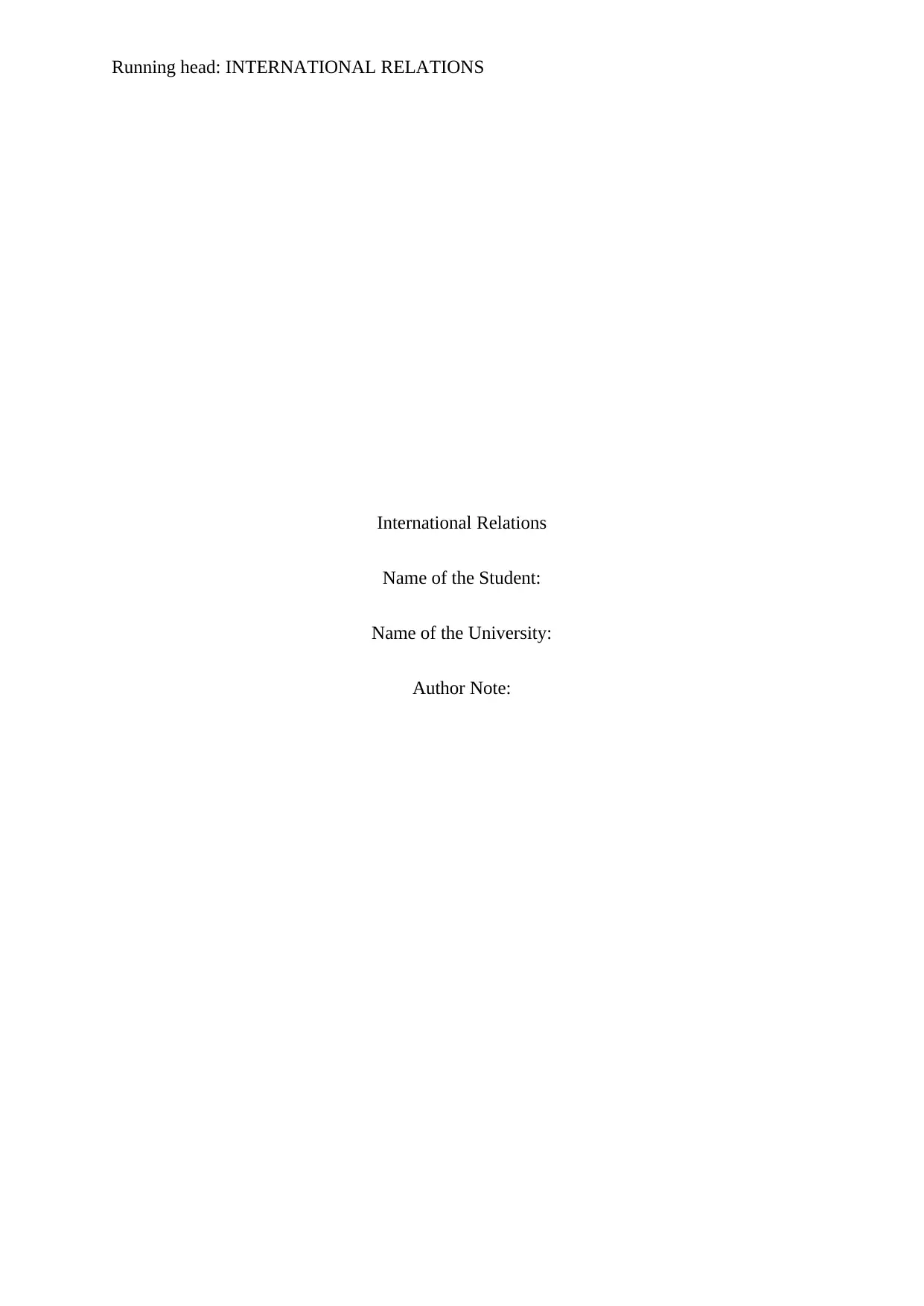
Running head: INTERNATIONAL RELATIONS
International Relations
Name of the Student:
Name of the University:
Author Note:
International Relations
Name of the Student:
Name of the University:
Author Note:
Paraphrase This Document
Need a fresh take? Get an instant paraphrase of this document with our AI Paraphraser
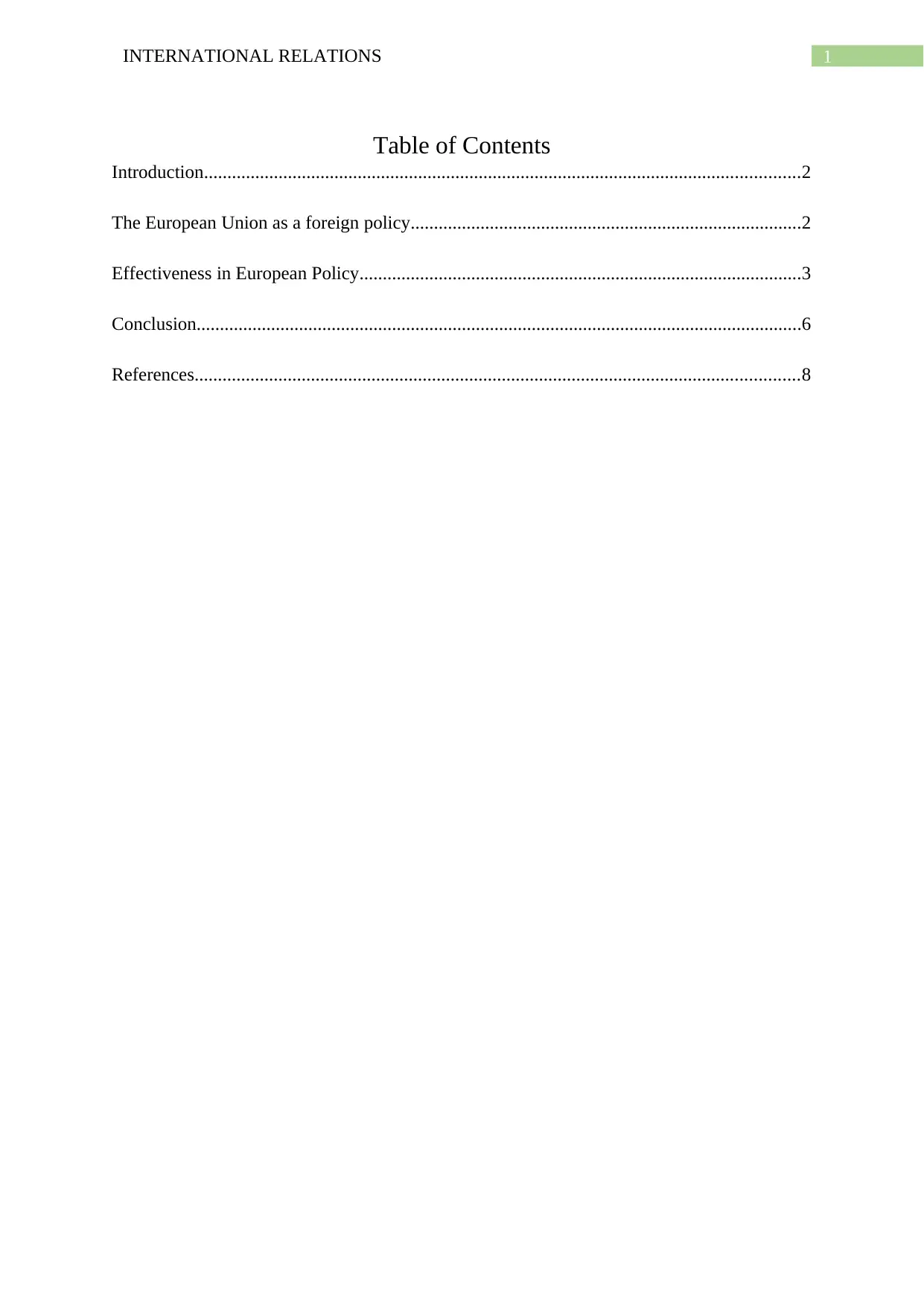
1INTERNATIONAL RELATIONS
Table of Contents
Introduction................................................................................................................................2
The European Union as a foreign policy....................................................................................2
Effectiveness in European Policy...............................................................................................3
Conclusion..................................................................................................................................6
References..................................................................................................................................8
Table of Contents
Introduction................................................................................................................................2
The European Union as a foreign policy....................................................................................2
Effectiveness in European Policy...............................................................................................3
Conclusion..................................................................................................................................6
References..................................................................................................................................8
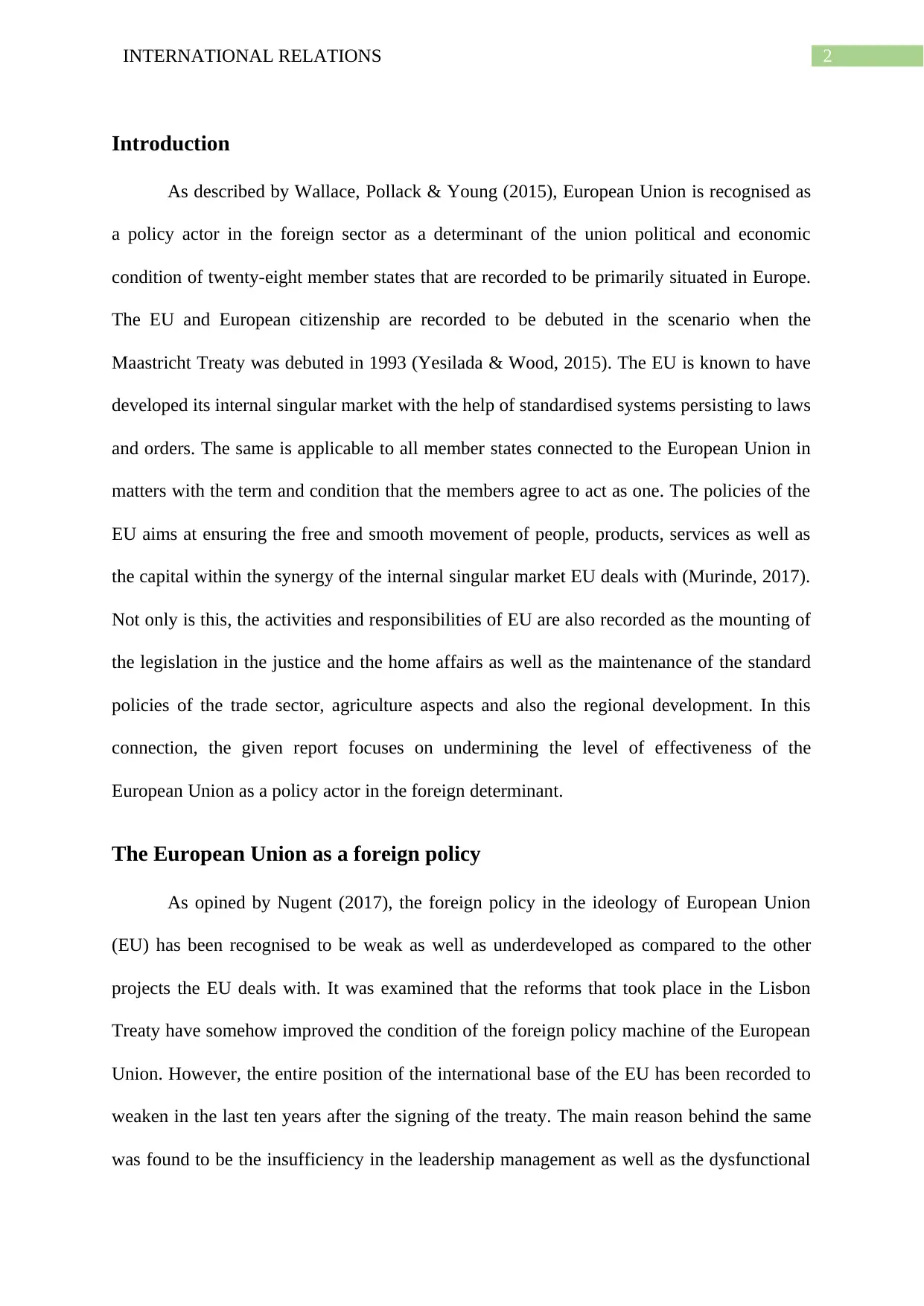
2INTERNATIONAL RELATIONS
Introduction
As described by Wallace, Pollack & Young (2015), European Union is recognised as
a policy actor in the foreign sector as a determinant of the union political and economic
condition of twenty-eight member states that are recorded to be primarily situated in Europe.
The EU and European citizenship are recorded to be debuted in the scenario when the
Maastricht Treaty was debuted in 1993 (Yesilada & Wood, 2015). The EU is known to have
developed its internal singular market with the help of standardised systems persisting to laws
and orders. The same is applicable to all member states connected to the European Union in
matters with the term and condition that the members agree to act as one. The policies of the
EU aims at ensuring the free and smooth movement of people, products, services as well as
the capital within the synergy of the internal singular market EU deals with (Murinde, 2017).
Not only is this, the activities and responsibilities of EU are also recorded as the mounting of
the legislation in the justice and the home affairs as well as the maintenance of the standard
policies of the trade sector, agriculture aspects and also the regional development. In this
connection, the given report focuses on undermining the level of effectiveness of the
European Union as a policy actor in the foreign determinant.
The European Union as a foreign policy
As opined by Nugent (2017), the foreign policy in the ideology of European Union
(EU) has been recognised to be weak as well as underdeveloped as compared to the other
projects the EU deals with. It was examined that the reforms that took place in the Lisbon
Treaty have somehow improved the condition of the foreign policy machine of the European
Union. However, the entire position of the international base of the EU has been recorded to
weaken in the last ten years after the signing of the treaty. The main reason behind the same
was found to be the insufficiency in the leadership management as well as the dysfunctional
Introduction
As described by Wallace, Pollack & Young (2015), European Union is recognised as
a policy actor in the foreign sector as a determinant of the union political and economic
condition of twenty-eight member states that are recorded to be primarily situated in Europe.
The EU and European citizenship are recorded to be debuted in the scenario when the
Maastricht Treaty was debuted in 1993 (Yesilada & Wood, 2015). The EU is known to have
developed its internal singular market with the help of standardised systems persisting to laws
and orders. The same is applicable to all member states connected to the European Union in
matters with the term and condition that the members agree to act as one. The policies of the
EU aims at ensuring the free and smooth movement of people, products, services as well as
the capital within the synergy of the internal singular market EU deals with (Murinde, 2017).
Not only is this, the activities and responsibilities of EU are also recorded as the mounting of
the legislation in the justice and the home affairs as well as the maintenance of the standard
policies of the trade sector, agriculture aspects and also the regional development. In this
connection, the given report focuses on undermining the level of effectiveness of the
European Union as a policy actor in the foreign determinant.
The European Union as a foreign policy
As opined by Nugent (2017), the foreign policy in the ideology of European Union
(EU) has been recognised to be weak as well as underdeveloped as compared to the other
projects the EU deals with. It was examined that the reforms that took place in the Lisbon
Treaty have somehow improved the condition of the foreign policy machine of the European
Union. However, the entire position of the international base of the EU has been recorded to
weaken in the last ten years after the signing of the treaty. The main reason behind the same
was found to be the insufficiency in the leadership management as well as the dysfunctional
⊘ This is a preview!⊘
Do you want full access?
Subscribe today to unlock all pages.

Trusted by 1+ million students worldwide
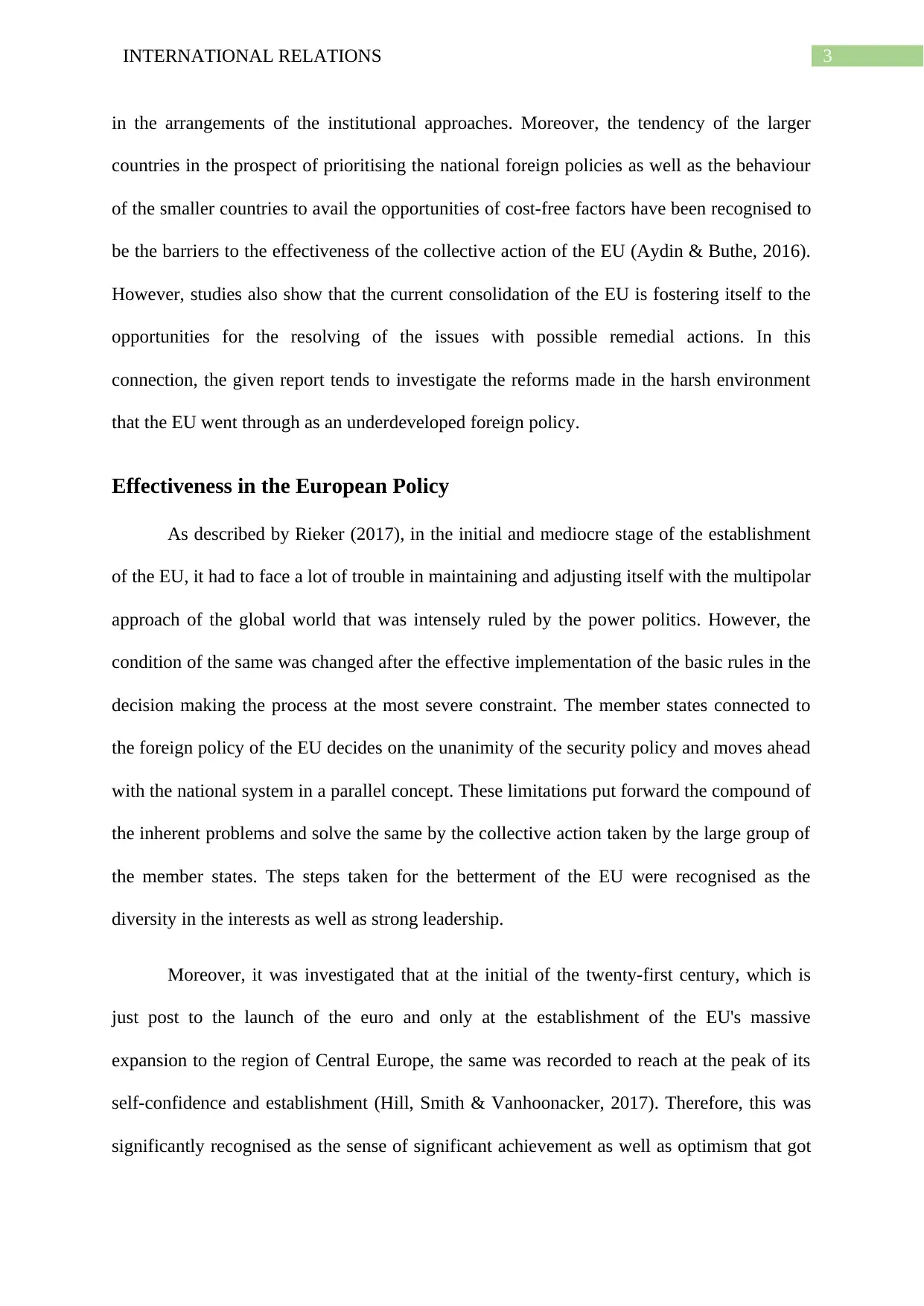
3INTERNATIONAL RELATIONS
in the arrangements of the institutional approaches. Moreover, the tendency of the larger
countries in the prospect of prioritising the national foreign policies as well as the behaviour
of the smaller countries to avail the opportunities of cost-free factors have been recognised to
be the barriers to the effectiveness of the collective action of the EU (Aydin & Buthe, 2016).
However, studies also show that the current consolidation of the EU is fostering itself to the
opportunities for the resolving of the issues with possible remedial actions. In this
connection, the given report tends to investigate the reforms made in the harsh environment
that the EU went through as an underdeveloped foreign policy.
Effectiveness in the European Policy
As described by Rieker (2017), in the initial and mediocre stage of the establishment
of the EU, it had to face a lot of trouble in maintaining and adjusting itself with the multipolar
approach of the global world that was intensely ruled by the power politics. However, the
condition of the same was changed after the effective implementation of the basic rules in the
decision making the process at the most severe constraint. The member states connected to
the foreign policy of the EU decides on the unanimity of the security policy and moves ahead
with the national system in a parallel concept. These limitations put forward the compound of
the inherent problems and solve the same by the collective action taken by the large group of
the member states. The steps taken for the betterment of the EU were recognised as the
diversity in the interests as well as strong leadership.
Moreover, it was investigated that at the initial of the twenty-first century, which is
just post to the launch of the euro and only at the establishment of the EU's massive
expansion to the region of Central Europe, the same was recorded to reach at the peak of its
self-confidence and establishment (Hill, Smith & Vanhoonacker, 2017). Therefore, this was
significantly recognised as the sense of significant achievement as well as optimism that got
in the arrangements of the institutional approaches. Moreover, the tendency of the larger
countries in the prospect of prioritising the national foreign policies as well as the behaviour
of the smaller countries to avail the opportunities of cost-free factors have been recognised to
be the barriers to the effectiveness of the collective action of the EU (Aydin & Buthe, 2016).
However, studies also show that the current consolidation of the EU is fostering itself to the
opportunities for the resolving of the issues with possible remedial actions. In this
connection, the given report tends to investigate the reforms made in the harsh environment
that the EU went through as an underdeveloped foreign policy.
Effectiveness in the European Policy
As described by Rieker (2017), in the initial and mediocre stage of the establishment
of the EU, it had to face a lot of trouble in maintaining and adjusting itself with the multipolar
approach of the global world that was intensely ruled by the power politics. However, the
condition of the same was changed after the effective implementation of the basic rules in the
decision making the process at the most severe constraint. The member states connected to
the foreign policy of the EU decides on the unanimity of the security policy and moves ahead
with the national system in a parallel concept. These limitations put forward the compound of
the inherent problems and solve the same by the collective action taken by the large group of
the member states. The steps taken for the betterment of the EU were recognised as the
diversity in the interests as well as strong leadership.
Moreover, it was investigated that at the initial of the twenty-first century, which is
just post to the launch of the euro and only at the establishment of the EU's massive
expansion to the region of Central Europe, the same was recorded to reach at the peak of its
self-confidence and establishment (Hill, Smith & Vanhoonacker, 2017). Therefore, this was
significantly recognised as the sense of significant achievement as well as optimism that got
Paraphrase This Document
Need a fresh take? Get an instant paraphrase of this document with our AI Paraphraser
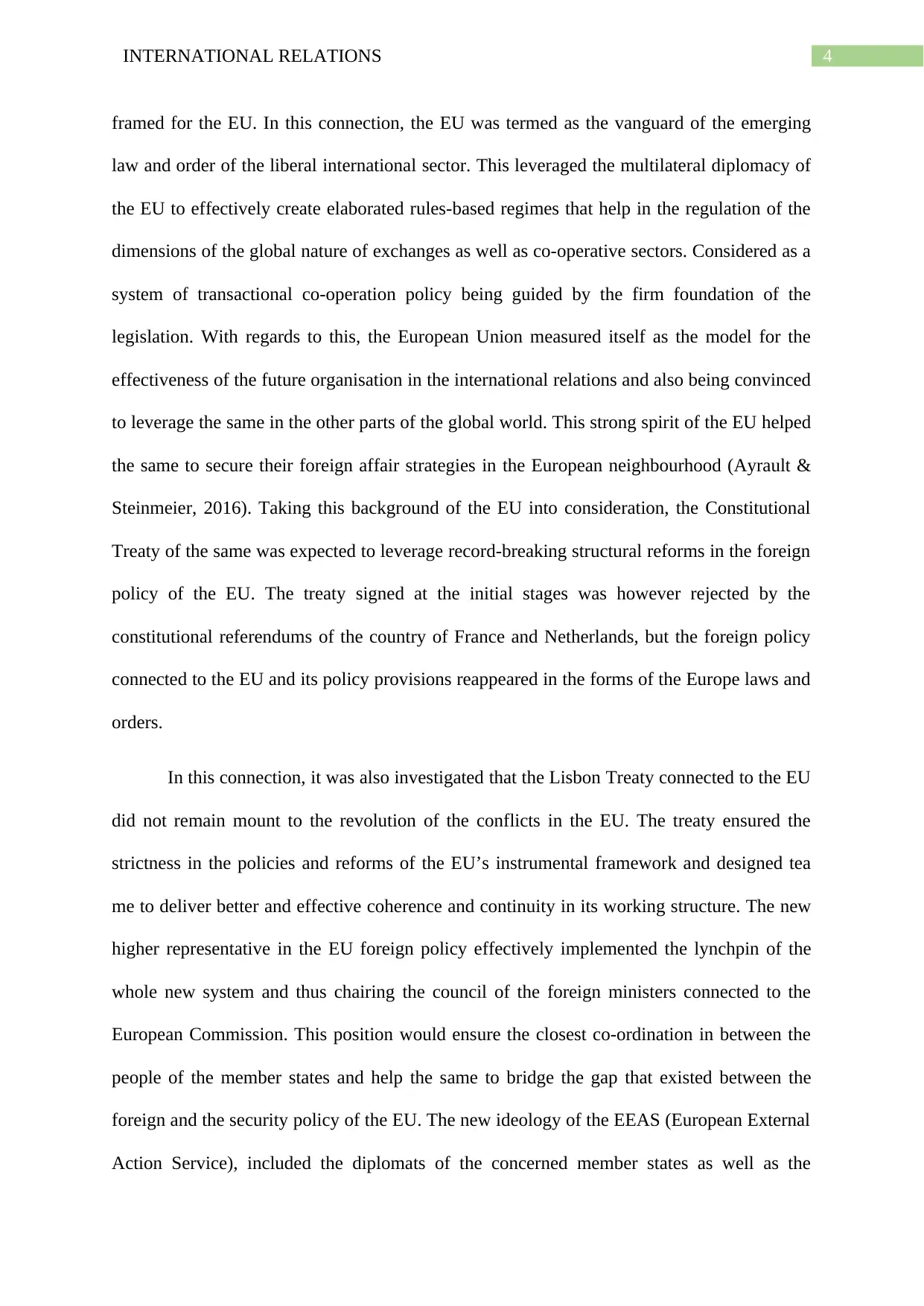
4INTERNATIONAL RELATIONS
framed for the EU. In this connection, the EU was termed as the vanguard of the emerging
law and order of the liberal international sector. This leveraged the multilateral diplomacy of
the EU to effectively create elaborated rules-based regimes that help in the regulation of the
dimensions of the global nature of exchanges as well as co-operative sectors. Considered as a
system of transactional co-operation policy being guided by the firm foundation of the
legislation. With regards to this, the European Union measured itself as the model for the
effectiveness of the future organisation in the international relations and also being convinced
to leverage the same in the other parts of the global world. This strong spirit of the EU helped
the same to secure their foreign affair strategies in the European neighbourhood (Ayrault &
Steinmeier, 2016). Taking this background of the EU into consideration, the Constitutional
Treaty of the same was expected to leverage record-breaking structural reforms in the foreign
policy of the EU. The treaty signed at the initial stages was however rejected by the
constitutional referendums of the country of France and Netherlands, but the foreign policy
connected to the EU and its policy provisions reappeared in the forms of the Europe laws and
orders.
In this connection, it was also investigated that the Lisbon Treaty connected to the EU
did not remain mount to the revolution of the conflicts in the EU. The treaty ensured the
strictness in the policies and reforms of the EU’s instrumental framework and designed tea
me to deliver better and effective coherence and continuity in its working structure. The new
higher representative in the EU foreign policy effectively implemented the lynchpin of the
whole new system and thus chairing the council of the foreign ministers connected to the
European Commission. This position would ensure the closest co-ordination in between the
people of the member states and help the same to bridge the gap that existed between the
foreign and the security policy of the EU. The new ideology of the EEAS (European External
Action Service), included the diplomats of the concerned member states as well as the
framed for the EU. In this connection, the EU was termed as the vanguard of the emerging
law and order of the liberal international sector. This leveraged the multilateral diplomacy of
the EU to effectively create elaborated rules-based regimes that help in the regulation of the
dimensions of the global nature of exchanges as well as co-operative sectors. Considered as a
system of transactional co-operation policy being guided by the firm foundation of the
legislation. With regards to this, the European Union measured itself as the model for the
effectiveness of the future organisation in the international relations and also being convinced
to leverage the same in the other parts of the global world. This strong spirit of the EU helped
the same to secure their foreign affair strategies in the European neighbourhood (Ayrault &
Steinmeier, 2016). Taking this background of the EU into consideration, the Constitutional
Treaty of the same was expected to leverage record-breaking structural reforms in the foreign
policy of the EU. The treaty signed at the initial stages was however rejected by the
constitutional referendums of the country of France and Netherlands, but the foreign policy
connected to the EU and its policy provisions reappeared in the forms of the Europe laws and
orders.
In this connection, it was also investigated that the Lisbon Treaty connected to the EU
did not remain mount to the revolution of the conflicts in the EU. The treaty ensured the
strictness in the policies and reforms of the EU’s instrumental framework and designed tea
me to deliver better and effective coherence and continuity in its working structure. The new
higher representative in the EU foreign policy effectively implemented the lynchpin of the
whole new system and thus chairing the council of the foreign ministers connected to the
European Commission. This position would ensure the closest co-ordination in between the
people of the member states and help the same to bridge the gap that existed between the
foreign and the security policy of the EU. The new ideology of the EEAS (European External
Action Service), included the diplomats of the concerned member states as well as the
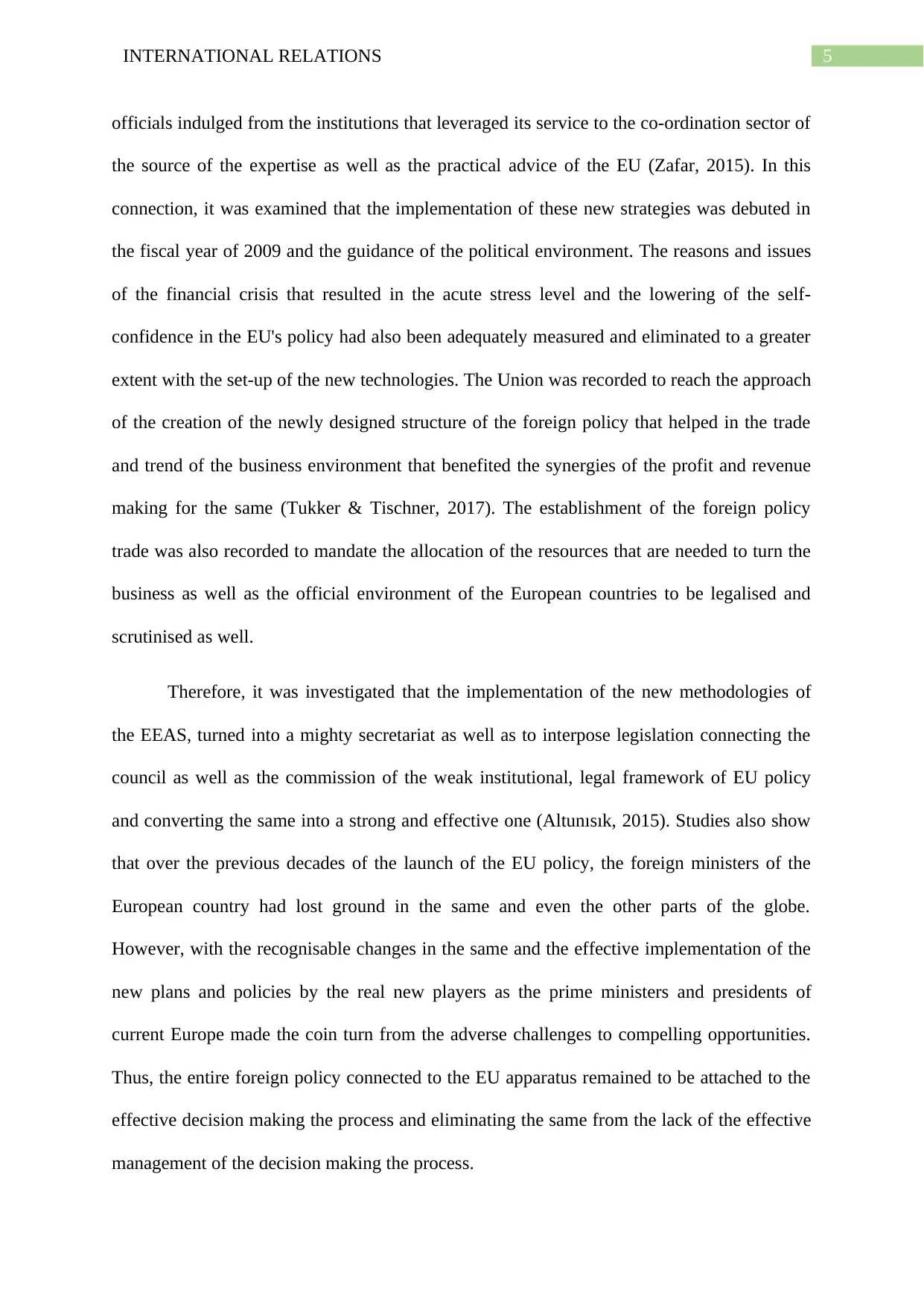
5INTERNATIONAL RELATIONS
officials indulged from the institutions that leveraged its service to the co-ordination sector of
the source of the expertise as well as the practical advice of the EU (Zafar, 2015). In this
connection, it was examined that the implementation of these new strategies was debuted in
the fiscal year of 2009 and the guidance of the political environment. The reasons and issues
of the financial crisis that resulted in the acute stress level and the lowering of the self-
confidence in the EU's policy had also been adequately measured and eliminated to a greater
extent with the set-up of the new technologies. The Union was recorded to reach the approach
of the creation of the newly designed structure of the foreign policy that helped in the trade
and trend of the business environment that benefited the synergies of the profit and revenue
making for the same (Tukker & Tischner, 2017). The establishment of the foreign policy
trade was also recorded to mandate the allocation of the resources that are needed to turn the
business as well as the official environment of the European countries to be legalised and
scrutinised as well.
Therefore, it was investigated that the implementation of the new methodologies of
the EEAS, turned into a mighty secretariat as well as to interpose legislation connecting the
council as well as the commission of the weak institutional, legal framework of EU policy
and converting the same into a strong and effective one (Altunısık, 2015). Studies also show
that over the previous decades of the launch of the EU policy, the foreign ministers of the
European country had lost ground in the same and even the other parts of the globe.
However, with the recognisable changes in the same and the effective implementation of the
new plans and policies by the real new players as the prime ministers and presidents of
current Europe made the coin turn from the adverse challenges to compelling opportunities.
Thus, the entire foreign policy connected to the EU apparatus remained to be attached to the
effective decision making the process and eliminating the same from the lack of the effective
management of the decision making the process.
officials indulged from the institutions that leveraged its service to the co-ordination sector of
the source of the expertise as well as the practical advice of the EU (Zafar, 2015). In this
connection, it was examined that the implementation of these new strategies was debuted in
the fiscal year of 2009 and the guidance of the political environment. The reasons and issues
of the financial crisis that resulted in the acute stress level and the lowering of the self-
confidence in the EU's policy had also been adequately measured and eliminated to a greater
extent with the set-up of the new technologies. The Union was recorded to reach the approach
of the creation of the newly designed structure of the foreign policy that helped in the trade
and trend of the business environment that benefited the synergies of the profit and revenue
making for the same (Tukker & Tischner, 2017). The establishment of the foreign policy
trade was also recorded to mandate the allocation of the resources that are needed to turn the
business as well as the official environment of the European countries to be legalised and
scrutinised as well.
Therefore, it was investigated that the implementation of the new methodologies of
the EEAS, turned into a mighty secretariat as well as to interpose legislation connecting the
council as well as the commission of the weak institutional, legal framework of EU policy
and converting the same into a strong and effective one (Altunısık, 2015). Studies also show
that over the previous decades of the launch of the EU policy, the foreign ministers of the
European country had lost ground in the same and even the other parts of the globe.
However, with the recognisable changes in the same and the effective implementation of the
new plans and policies by the real new players as the prime ministers and presidents of
current Europe made the coin turn from the adverse challenges to compelling opportunities.
Thus, the entire foreign policy connected to the EU apparatus remained to be attached to the
effective decision making the process and eliminating the same from the lack of the effective
management of the decision making the process.
⊘ This is a preview!⊘
Do you want full access?
Subscribe today to unlock all pages.

Trusted by 1+ million students worldwide
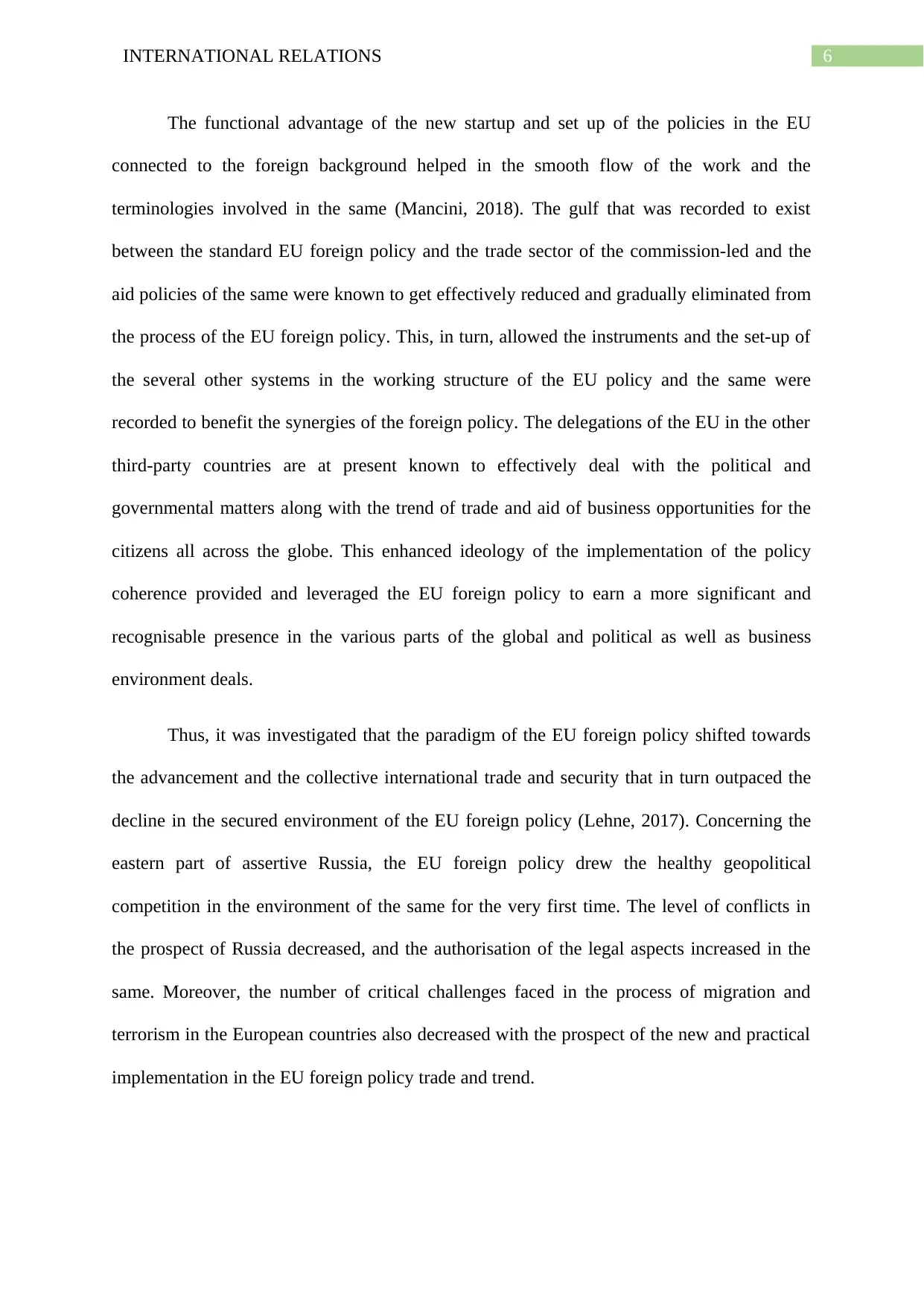
6INTERNATIONAL RELATIONS
The functional advantage of the new startup and set up of the policies in the EU
connected to the foreign background helped in the smooth flow of the work and the
terminologies involved in the same (Mancini, 2018). The gulf that was recorded to exist
between the standard EU foreign policy and the trade sector of the commission-led and the
aid policies of the same were known to get effectively reduced and gradually eliminated from
the process of the EU foreign policy. This, in turn, allowed the instruments and the set-up of
the several other systems in the working structure of the EU policy and the same were
recorded to benefit the synergies of the foreign policy. The delegations of the EU in the other
third-party countries are at present known to effectively deal with the political and
governmental matters along with the trend of trade and aid of business opportunities for the
citizens all across the globe. This enhanced ideology of the implementation of the policy
coherence provided and leveraged the EU foreign policy to earn a more significant and
recognisable presence in the various parts of the global and political as well as business
environment deals.
Thus, it was investigated that the paradigm of the EU foreign policy shifted towards
the advancement and the collective international trade and security that in turn outpaced the
decline in the secured environment of the EU foreign policy (Lehne, 2017). Concerning the
eastern part of assertive Russia, the EU foreign policy drew the healthy geopolitical
competition in the environment of the same for the very first time. The level of conflicts in
the prospect of Russia decreased, and the authorisation of the legal aspects increased in the
same. Moreover, the number of critical challenges faced in the process of migration and
terrorism in the European countries also decreased with the prospect of the new and practical
implementation in the EU foreign policy trade and trend.
The functional advantage of the new startup and set up of the policies in the EU
connected to the foreign background helped in the smooth flow of the work and the
terminologies involved in the same (Mancini, 2018). The gulf that was recorded to exist
between the standard EU foreign policy and the trade sector of the commission-led and the
aid policies of the same were known to get effectively reduced and gradually eliminated from
the process of the EU foreign policy. This, in turn, allowed the instruments and the set-up of
the several other systems in the working structure of the EU policy and the same were
recorded to benefit the synergies of the foreign policy. The delegations of the EU in the other
third-party countries are at present known to effectively deal with the political and
governmental matters along with the trend of trade and aid of business opportunities for the
citizens all across the globe. This enhanced ideology of the implementation of the policy
coherence provided and leveraged the EU foreign policy to earn a more significant and
recognisable presence in the various parts of the global and political as well as business
environment deals.
Thus, it was investigated that the paradigm of the EU foreign policy shifted towards
the advancement and the collective international trade and security that in turn outpaced the
decline in the secured environment of the EU foreign policy (Lehne, 2017). Concerning the
eastern part of assertive Russia, the EU foreign policy drew the healthy geopolitical
competition in the environment of the same for the very first time. The level of conflicts in
the prospect of Russia decreased, and the authorisation of the legal aspects increased in the
same. Moreover, the number of critical challenges faced in the process of migration and
terrorism in the European countries also decreased with the prospect of the new and practical
implementation in the EU foreign policy trade and trend.
Paraphrase This Document
Need a fresh take? Get an instant paraphrase of this document with our AI Paraphraser
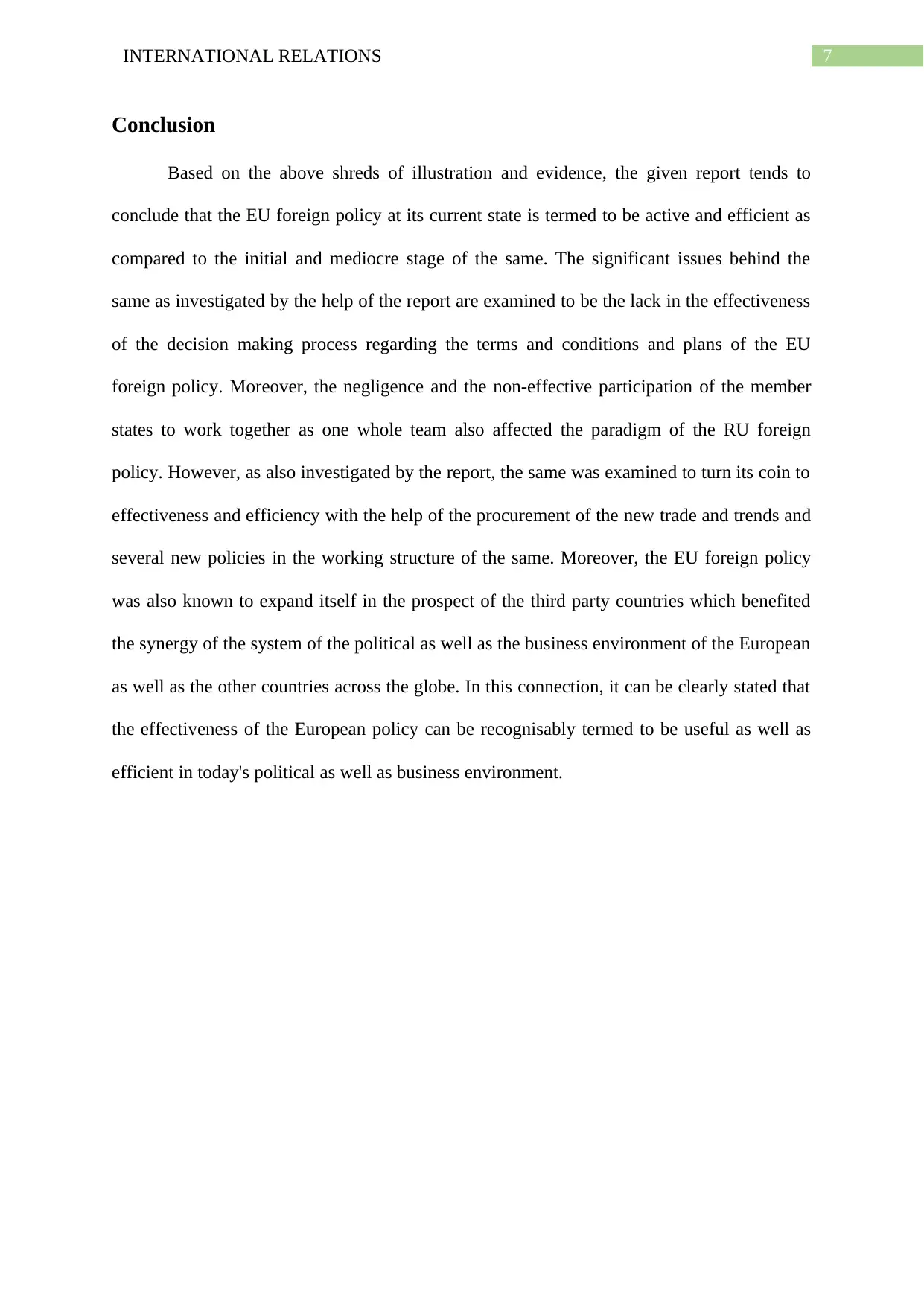
7INTERNATIONAL RELATIONS
Conclusion
Based on the above shreds of illustration and evidence, the given report tends to
conclude that the EU foreign policy at its current state is termed to be active and efficient as
compared to the initial and mediocre stage of the same. The significant issues behind the
same as investigated by the help of the report are examined to be the lack in the effectiveness
of the decision making process regarding the terms and conditions and plans of the EU
foreign policy. Moreover, the negligence and the non-effective participation of the member
states to work together as one whole team also affected the paradigm of the RU foreign
policy. However, as also investigated by the report, the same was examined to turn its coin to
effectiveness and efficiency with the help of the procurement of the new trade and trends and
several new policies in the working structure of the same. Moreover, the EU foreign policy
was also known to expand itself in the prospect of the third party countries which benefited
the synergy of the system of the political as well as the business environment of the European
as well as the other countries across the globe. In this connection, it can be clearly stated that
the effectiveness of the European policy can be recognisably termed to be useful as well as
efficient in today's political as well as business environment.
Conclusion
Based on the above shreds of illustration and evidence, the given report tends to
conclude that the EU foreign policy at its current state is termed to be active and efficient as
compared to the initial and mediocre stage of the same. The significant issues behind the
same as investigated by the help of the report are examined to be the lack in the effectiveness
of the decision making process regarding the terms and conditions and plans of the EU
foreign policy. Moreover, the negligence and the non-effective participation of the member
states to work together as one whole team also affected the paradigm of the RU foreign
policy. However, as also investigated by the report, the same was examined to turn its coin to
effectiveness and efficiency with the help of the procurement of the new trade and trends and
several new policies in the working structure of the same. Moreover, the EU foreign policy
was also known to expand itself in the prospect of the third party countries which benefited
the synergy of the system of the political as well as the business environment of the European
as well as the other countries across the globe. In this connection, it can be clearly stated that
the effectiveness of the European policy can be recognisably termed to be useful as well as
efficient in today's political as well as business environment.
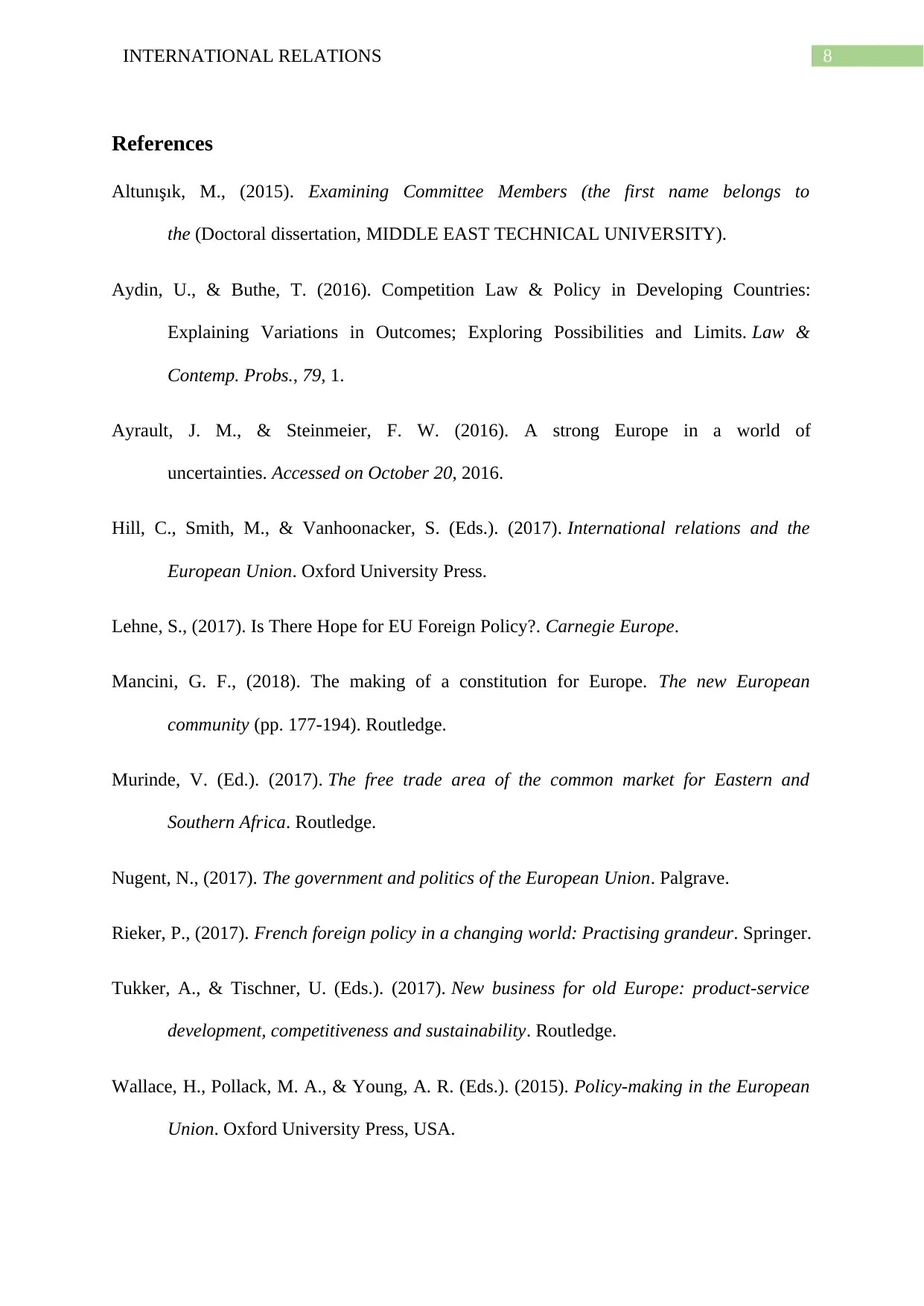
8INTERNATIONAL RELATIONS
References
Altunışık, M., (2015). Examining Committee Members (the first name belongs to
the (Doctoral dissertation, MIDDLE EAST TECHNICAL UNIVERSITY).
Aydin, U., & Buthe, T. (2016). Competition Law & Policy in Developing Countries:
Explaining Variations in Outcomes; Exploring Possibilities and Limits. Law &
Contemp. Probs., 79, 1.
Ayrault, J. M., & Steinmeier, F. W. (2016). A strong Europe in a world of
uncertainties. Accessed on October 20, 2016.
Hill, C., Smith, M., & Vanhoonacker, S. (Eds.). (2017). International relations and the
European Union. Oxford University Press.
Lehne, S., (2017). Is There Hope for EU Foreign Policy?. Carnegie Europe.
Mancini, G. F., (2018). The making of a constitution for Europe. The new European
community (pp. 177-194). Routledge.
Murinde, V. (Ed.). (2017). The free trade area of the common market for Eastern and
Southern Africa. Routledge.
Nugent, N., (2017). The government and politics of the European Union. Palgrave.
Rieker, P., (2017). French foreign policy in a changing world: Practising grandeur. Springer.
Tukker, A., & Tischner, U. (Eds.). (2017). New business for old Europe: product-service
development, competitiveness and sustainability. Routledge.
Wallace, H., Pollack, M. A., & Young, A. R. (Eds.). (2015). Policy-making in the European
Union. Oxford University Press, USA.
References
Altunışık, M., (2015). Examining Committee Members (the first name belongs to
the (Doctoral dissertation, MIDDLE EAST TECHNICAL UNIVERSITY).
Aydin, U., & Buthe, T. (2016). Competition Law & Policy in Developing Countries:
Explaining Variations in Outcomes; Exploring Possibilities and Limits. Law &
Contemp. Probs., 79, 1.
Ayrault, J. M., & Steinmeier, F. W. (2016). A strong Europe in a world of
uncertainties. Accessed on October 20, 2016.
Hill, C., Smith, M., & Vanhoonacker, S. (Eds.). (2017). International relations and the
European Union. Oxford University Press.
Lehne, S., (2017). Is There Hope for EU Foreign Policy?. Carnegie Europe.
Mancini, G. F., (2018). The making of a constitution for Europe. The new European
community (pp. 177-194). Routledge.
Murinde, V. (Ed.). (2017). The free trade area of the common market for Eastern and
Southern Africa. Routledge.
Nugent, N., (2017). The government and politics of the European Union. Palgrave.
Rieker, P., (2017). French foreign policy in a changing world: Practising grandeur. Springer.
Tukker, A., & Tischner, U. (Eds.). (2017). New business for old Europe: product-service
development, competitiveness and sustainability. Routledge.
Wallace, H., Pollack, M. A., & Young, A. R. (Eds.). (2015). Policy-making in the European
Union. Oxford University Press, USA.
⊘ This is a preview!⊘
Do you want full access?
Subscribe today to unlock all pages.

Trusted by 1+ million students worldwide
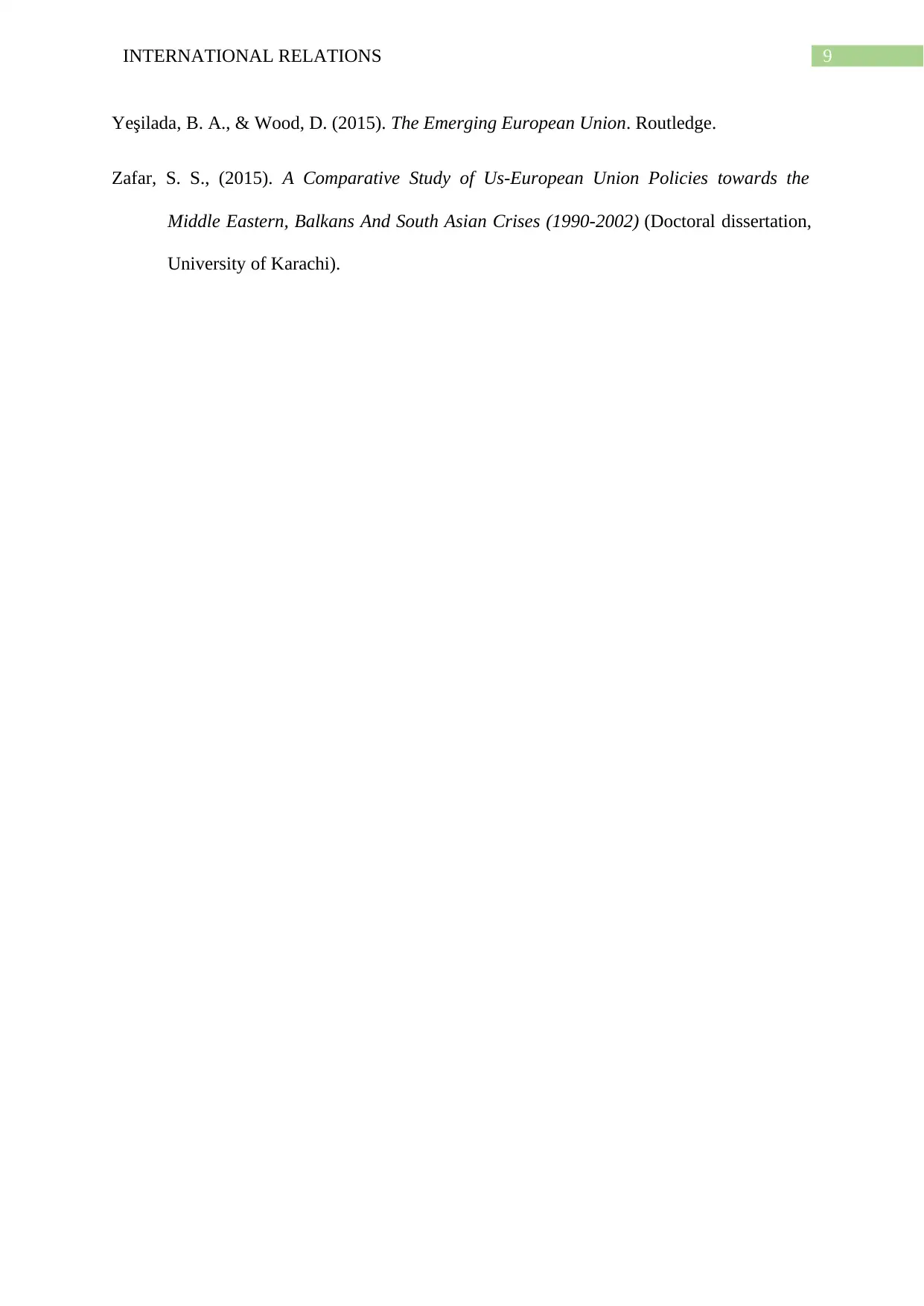
9INTERNATIONAL RELATIONS
Yeşilada, B. A., & Wood, D. (2015). The Emerging European Union. Routledge.
Zafar, S. S., (2015). A Comparative Study of Us-European Union Policies towards the
Middle Eastern, Balkans And South Asian Crises (1990-2002) (Doctoral dissertation,
University of Karachi).
Yeşilada, B. A., & Wood, D. (2015). The Emerging European Union. Routledge.
Zafar, S. S., (2015). A Comparative Study of Us-European Union Policies towards the
Middle Eastern, Balkans And South Asian Crises (1990-2002) (Doctoral dissertation,
University of Karachi).
1 out of 10
Related Documents
Your All-in-One AI-Powered Toolkit for Academic Success.
+13062052269
info@desklib.com
Available 24*7 on WhatsApp / Email
![[object Object]](/_next/static/media/star-bottom.7253800d.svg)
Unlock your academic potential
Copyright © 2020–2026 A2Z Services. All Rights Reserved. Developed and managed by ZUCOL.





